
Transcription
5/7/2020
Reducing populations in our prisons and jails is matter of life and death
ACLU
Here's a hard truth, Charles: We could lose as many as 200,000 people to COVID-29 - more than double the government's estimate - if we don't dramatically and immediately reduce the number of people in jails.
As the world's largest incarcerator, we face a unique challenge in combating COVID-19. That means that the estimated death toll U.S. officials have shared - largely based on data from other countries - grossly underestimates the impact this virus will have in the U.S.
That's why we teamed up with epidemiologists, mathematicians, and statisticians to get an accurate count of what the true toll would be in the country that has 21% of the world's incarcerated population.
Learn more about our study on COVID-19 will spread in jails, and what steps we can take to save lives.
We have the power to change this grim outcome, Charles.
ACLU advocates have been pressuring governors, police, prosecutors and sheriffs to reduce their prison and jail populations, which has already resulted in 23 executive actions in 15 states. To date, this work has led to at least 17,000 fewer people in prisons and jails.
That's progress, but its not nearly enough. We need to safely release tens of thousands of more people in order to save the lives of people in jails and prisons - and the broader community. In jails, as our report shows, we can do this by stopping arrests for all but the most serious offenses and ending practices like cash bail that prevent people from being released while they await their trial.
One more thing: COVID-19 has already taken the lives of so many people who are incarcerated or work in jails and prisons. But currently, there's no national database to help us memorialize the people who have passed away. So we're teaming up with the UCLA Prison Law and Policy Program to change that.
If you know of people who were incarcerated in jails or prisons and who have died from COVID-19, and would like to add a few words of rememberance, please take a look here. Help us make sure that the world never forgets the lives lost. (Please note: this link takes you to a third-party website, google.com. To add to the Google Sheet, click the top "view only" green button to request access.)
Thanks for your support,
Udi Ofer
ACLU Deputy National Political Director
---
https://www.aclu.org/news/smart-justice/new-model-shows-reducing-jail-population-will-lower-covid-19-death-toll-for-all-of-us
New Model Shows Reducing Jail Population will Lower COVID-19 Death Toll for All of Us
Udi Ofer, Director, Justice Division, ACLU National Political and Advocacy Department
Lucia Tian, Chief Analytics Officer, ACLU
April 22, 2020
The Trump administration optimistically projects that “substantially under” 100,000 people will die from COVID-19 in the United States. Horrific as that statistic is, a new model suggests it could be a huge underestimate. The government models fail to consider the impact of the virus on the incarcerated population, who will be infected and die at higher rates. And any prison or jail outbreak is bound to spill over into the broader community — causing more people to die in the general public, too.
The ACLU partnered with epidemiologists, mathematicians and statisticians to create a first-of-its-kind epidemiological model that shows that as many as 200,000 people could die from COVID-19 — double the government estimate — if we continue to ignore incarcerated people in our public health response. But we have the power to change this grim outcome. We can save as many as 23,000 people in jail and 76,000 in the broader community if we stop arrests for all but the most serious offenses and double the rate of release for those already detained.
Chart showing covid infections in jail increasing versus plateauing if we release incarcerated people
Chart showing covid infections in jail increasing versus plateauing if we release incarcerated people
The risk that COVID-19 poses to incarceration facilities is well-documented. Overcrowding, lack of access to hygiene, and substandard health care make jails and prisons potential time bombs for any outbreak, let alone the deadly coronavirus. But what often gets lost in the discourse is the connection between incarceration facilities and the broader community. Correctional staff come to work every day and then return home. People are frequently brought in on arrest and released if they can pay bail, or held for short stays. Any of these individuals can easily and unknowingly bring the virus into a jail, where infections can spread rapidly. And because of this constant flux of people, more sick people in jail will result in more sick people in the general public.
More sick people in jail will result in more sick people in the general public.
While all of us will be impacted by inaction, communities of color will feel it most. Black and Brown people are overrepresented in jails and prisons due to long-entrenched racial bias in the criminal legal system, as well as low-income communities. Most correctional staff are also people of color, who will return to families and communities of color while potentially carrying the virus. There is already ample evidence that Black people are dying at much higher rates in major cities across the country. We can expect even more racial disparities in COVID-19 deaths if we allow the virus to spread freely throughout jails.
But these statistics don’t have to be death sentences. We can flatten the infection curve and decrease infection rates for all of us by reducing the number of people we incarcerate. It’s easier than it may seem. Hundreds of thousands of people are sitting in jail simply because of technical violations, their inability to pay fines and fees, or because they can’t post bail. There is no reason these people should be locked up even under normal circumstances. During the pandemic, the need for reform is more urgent than ever.
Bar chart of covid deaths by public response
Bar chart of covid deaths by public response
Governors, judges, sheriffs, and chiefs of police can reduce jail populations without changing the law. They should use the powers of their office to stop arresting and incarcerating people for low-level offenses and release those who are vulnerable to COVID-19 due to age or health conditions. Taking these measures would significantly reduce the spread of COVID-19 in jails and thus reduce the death toll for all of us.
If we stop arresting people for minor offenses (cutting arrests by half), we can save up to 12,000 lives in jails and 47,000 lives in surrounding communities.
If we stop arrests for anything but the five percent of crimes defined as most serious by the FBI — including murder, rape, and assault — and are able to double the rate of release for those already detained, we can save 23,000 lives in jails, and 76,000 lives in communities.
These critical reforms are more urgent than ever, but they were needed long before the pandemic. The U.S. incarcerates more people than any other country on earth, with four percent of the world’s total population and 21 percent of the world’s incarcerated population. Further, reforming our incarceration and policing system would go a long way toward reducing inequalities and systemic harm faced by communities of color, who were already over-policed and overrepresented in jails and prisons to begin with.
Just stopping arrests for minor offenses would save 59,000 lives.
The ACLU has responded by creating a model executive order and pressuring governors to adopt it, as well as pushing prosecutors and sheriffs to use the power of their offices to reduce jail and prison populations. As a result of these efforts, 16,000 people have either been released or not incarcerated in the first place, and governors have made 15 executive actions. And according to an ACLU poll, there is strong bipartisan support for releasing people from prisons and jails, with 63 percent of respondents supporting the action.
Taking critical steps toward reform will save lives. Colorado, for example, has reduced its jail population by 31 percent and as a result, will save 1,100 lives and could cut the state’s death toll by a quarter.
What the numbers don’t show, however, are the individuals who have already faced the impact of our inaction. The ACLU has partnered with the UCLA Prison Law and Policy Program to create a directory of all the people who have died to COVID-19 while incarcerated. Every day that passes without initiating these vital incarceration reforms means that more people will die, and this list will grow. These are more than numbers.
COVID-19 has already changed the way we live and function as a society in ways that would have been unimaginable just a month ago. There is no reason to exclude prisons and jails from these radical changes — especially in a country that incarcerates more of its people than any other country on earth. It’s time for the government to act in the name of public health. Failing to protect incarcerated people will hurt all of us.
ACLU analysis was led by Aaron Horowitz, chief data scientist, and Brooke Madubuonwu, director of legal analytics and quantitative research.
====
https://www.aap.org/en/news-room/news-releases/aap/2020/american-academy-of-pediatrics-recommends-incarceration-of-youth-as-last-resort-especially-during-time-of-pandemic/
American Academy of Pediatrics
Dedicated to the Health of All Children
For Immediate Release
Media Contact:
Lisa Black
630-626-6084
lblack@aap.org
American Academy of Pediatrics Recommends Incarceration of Youth as Last Resort, Especially During Time of Pandemic
Under normal circumstances, incarcerated and detained youth often experience poor conditions while under confinement. The American Academy of Pediatrics, recognizing the heightened risks of COVID-19, has published a policy statement with recommendations for reform, reducing youth incarceration, lessening risk of virus transmission and opportunities for advocacy for the medical community.
Under normal circumstances, incarcerated and detained youth may experience poor conditions while under confinement. The American Academy of Pediatrics, recognizing the heightened risks of COVID-19, has published a policy statement with recommendations for reform, reducing youth incarceration, lessening risk of virus transmission and opportunities for advocacy for the medical community.
The policy statement, “Advocacy and Collaborative Health Care for Justice-Involved Youth,” available today, May 6, in Pediatrics online, calls attention to racial bias and overrepresentation of minority youth in the justice system and recommends alternatives to youth confinement. This is a prepublication version of the policy statement, which is being released early in conjunction with guidance offered in a separate article, “Responding to the Needs of Youth Involved with the Justice System During the COVID-19 Pandemic.”The guidance underscores the difficulties during the pandemic in caring for those detention, many of whom lack access to adequate medical or educational services.
The policy statement and guidance recommend community-based programs for youth as the first option, both during usual times and especially so in response to the COVID-19 epidemic. Incarceration of adolescents should be used as a last resort.
“Ideally, any contact with the juvenile justice system would serve as an opportunity to identify the young person’s risk factors for involvement with the justice system and provide services and resources to improve their health and developmental trajectory,” said Mikah C. Owen, MD, MPH, FAAP, lead author of the policy statement, developed by the AAP Committee on Adolescence.
“Nine out of 10 young people who enter the justice system have suffered some childhood trauma. For those incarcerated for substance use or other nonviolent offenses, they may be better off remaining in their community with services in place.”
On any given day, approximately 43,600 youth under 18 years of age are held in youth detention facilities across the United States, according to the policy statement. Outbreaks of COVID-19 in detention facilities have been reported, but the reporting methods vary by jurisdiction and state, and so there is no uniform way to track the prevalence of illness.
During the pandemic, incarcerated youth already have limited access to visitors, and “being confined during this pandemic could be really terrifying for young people,” Dr. Owen said. “You hear about people passing away in the community. You have limited access to you have limited information about the impact of the virus and how it affects young people, how it affects their families.”
The AAP offers recommendations specific to COVID-19 for the juvenile justice system that include:
*Release youth who can be safely cared for in their home communities. Create transition plans for youth released from custody that ensure their basic needs are met.
* Within the constraints of public safety, reduce new admissions to juvenile detention facilities and increase the use of diversion strategies.
* Develop and publish COVID-19 response plans and ensure data regarding suspected and confirmed cases are publicly available.
* Ensure all staff members are trained on the implementation of the response plans.
* Ensure that youth and families are notified of suspected and confirmed cases in a timely manner.
* Provide emergency funding to expand community-based services and supports for youth diverted or released from detention facilities.
“This statement offers many ways for pediatricians to advocate for young people beyond the detention facilities themselves,” Dr. Owen said. “With or without a pandemic, we are in a unique position to help within our own communities.”
[For an interview with an author, contact AAP Public Affairs.]
###
The American Academy of Pediatrics is an organization of 67,000 primary care pediatricians, pediatric medical subspecialists and pediatric surgical specialists dedicated to the health, safety and well-being of infants, children, adolescents and young adults.
For Release:
5/6/2020
Media Contact:
Lisa Black
630-626-6084
lblack@aap.org
Other posts by this author
|
2023 may 31

|
2023 mar 20
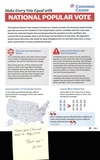
|
2022 aug 23

|
2022 aug 23

|
2022 aug 23

|
2022 aug 23

|
More... |
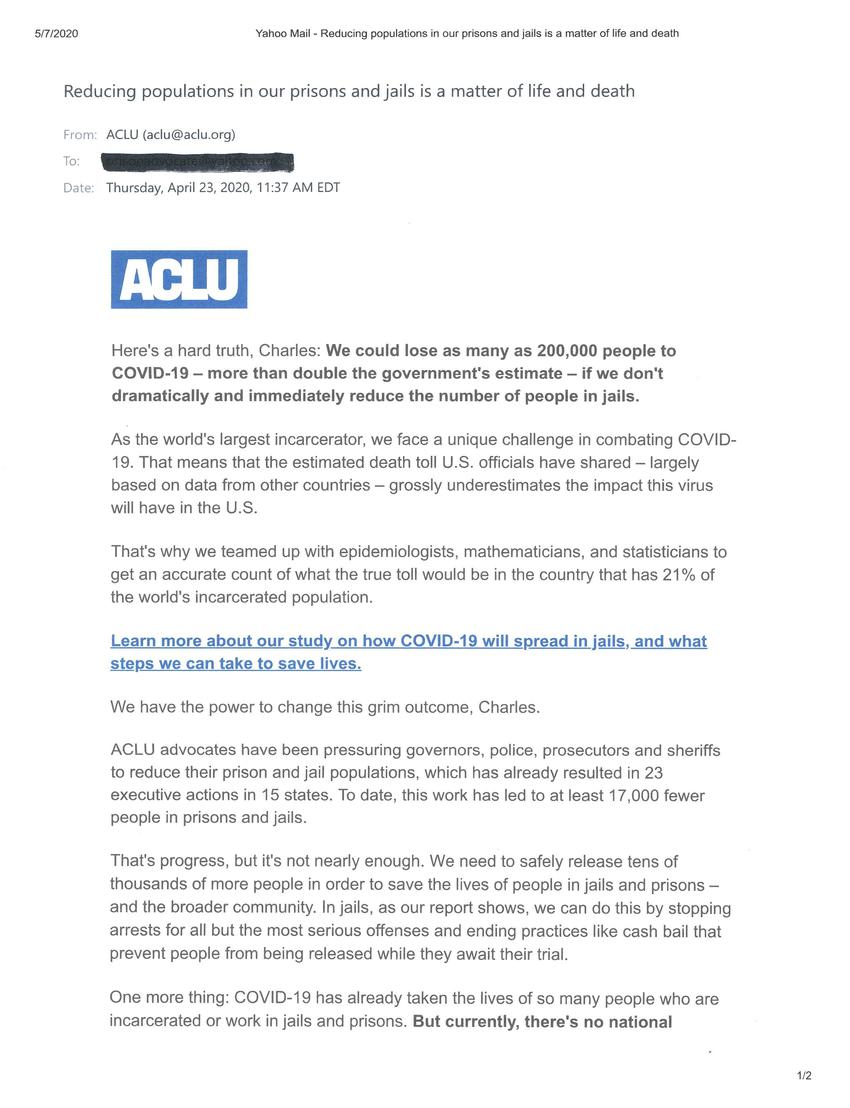
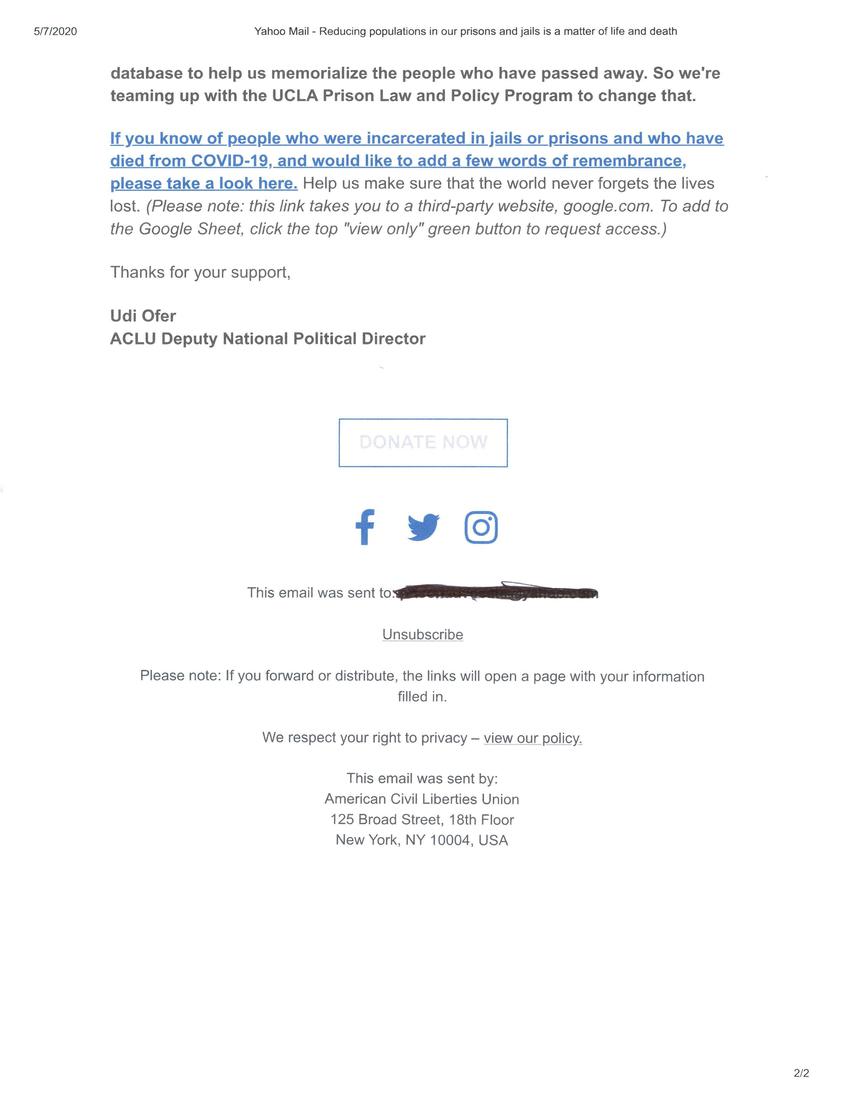
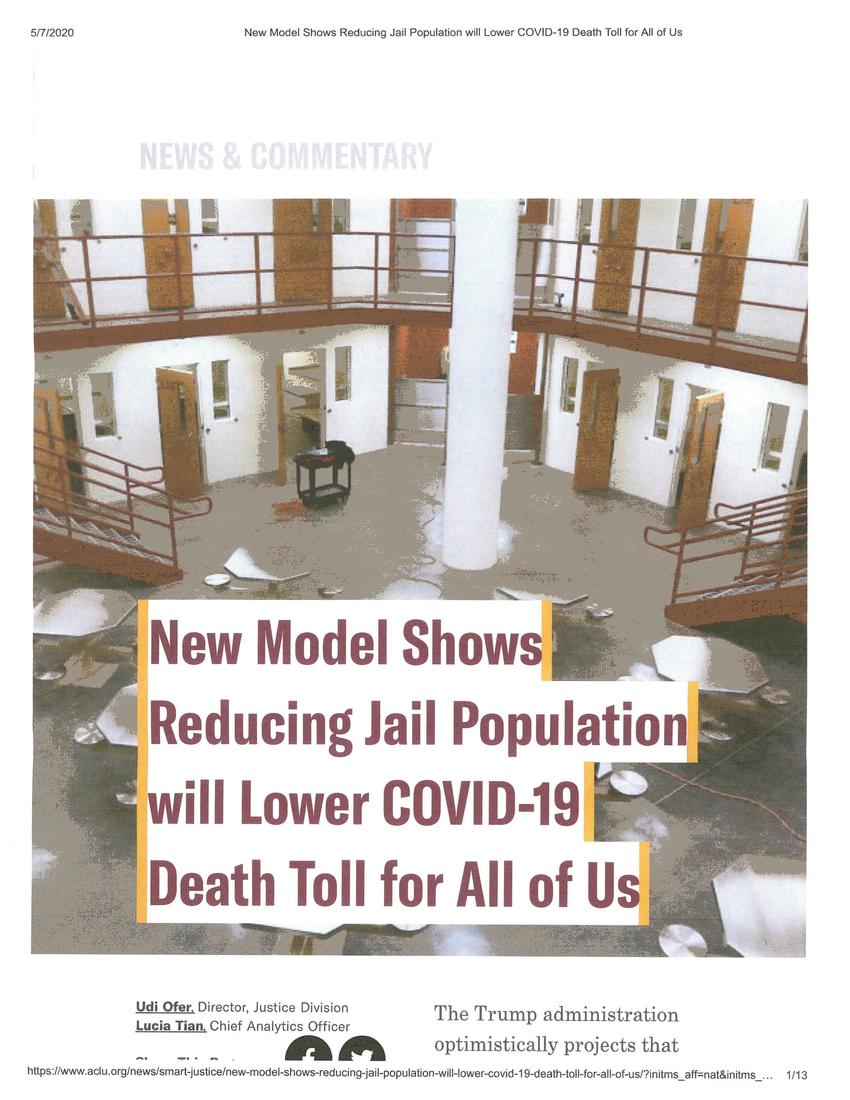
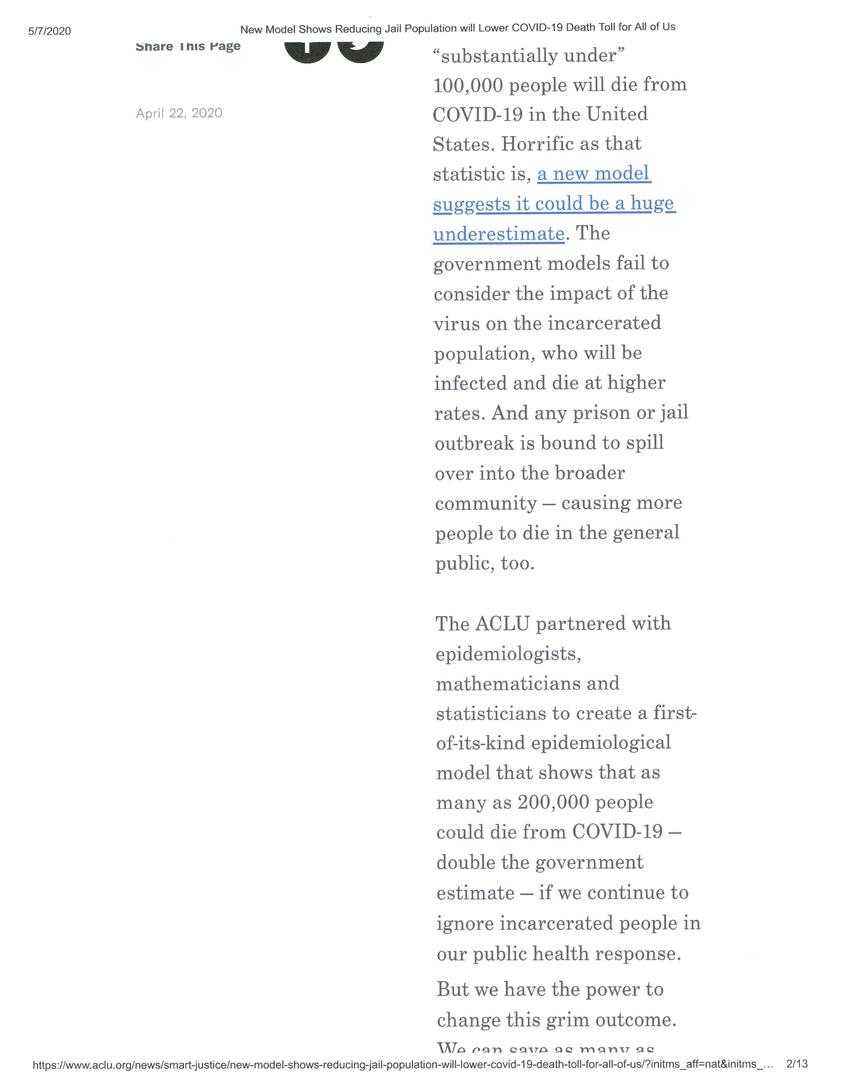
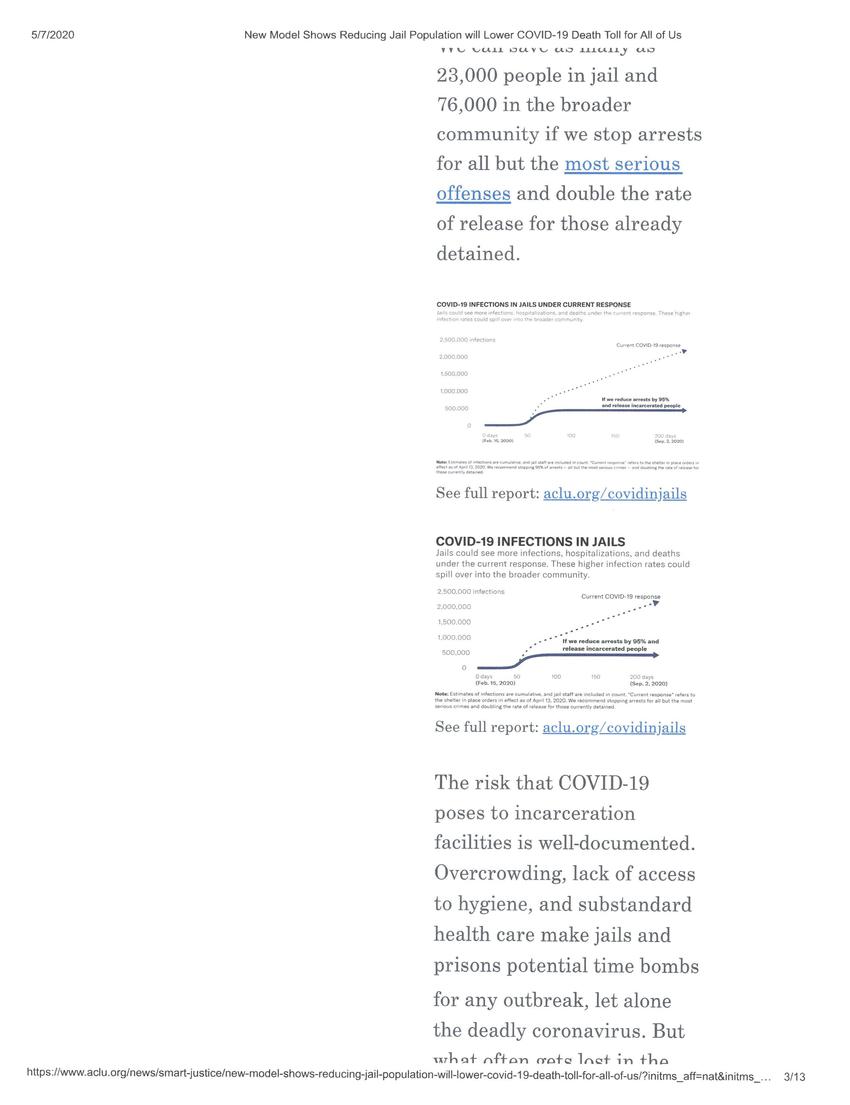
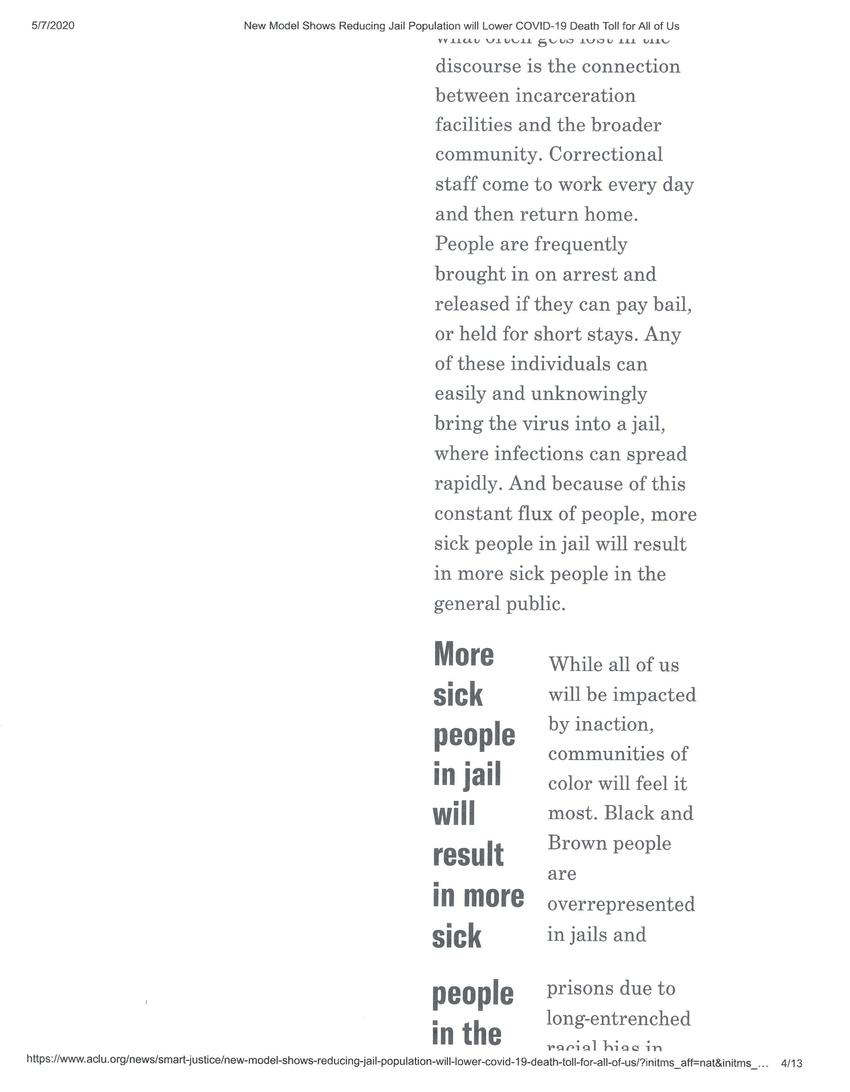

Replies